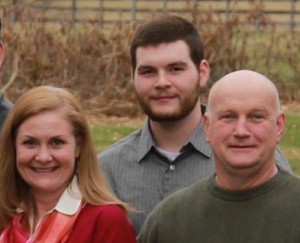Many of you have read my credentials or have heard that over the last 38 years my journey has expanded from being a therapist working with children and their families to being a teacher and administrator in classical Christian schools, as well as a few years in homeschooling. Since 2009, I’ve worked with students, families, and schools through Equipping Minds to provide hope.
However, you may not know that I have sat where you may be sitting now, desperately wanting to hear hope for my son, Clayton, who was struggling. That journey began abruptly when his entrance into this world was traumatic. We watched God breathe for him for the first 13 hours before the trauma team arrived and transported him to the neonatal unit–an hour and a half down the mountain. We were in rehabilitation therapy from the get-go, and the next ten years would be filled with evaluations, speech therapy, and many tears. He was diagnosed with a language processing disorder in receptive and expressive language. He also had symptoms of an auditory processing disorder, dyslexia, dyscalculia, and dysgraphia. His testing revealed weaknesses in all areas with an overall composite of below-average intellect.
With my education and experience, I began reading every book I could get my hands on and could never seem to find “Clayton” in any of those books. He did not say his first sentence until almost 4, but then he started talking up a storm. However, we couldn’t understand half of what he said. When he was 5, the private school of our choice would not accept him and even told me that he had scored lower than any other student.
Then God placed an educator in our path who came to our home for an assessment and said, “There is so much in there that wants to get out… I think our school would be perfect for Clayton.” This was a classical Christian school in Fletcher, NC, Veritas Christian Academy. He had an exceptional kindergarten year and scored 99% on his phonemic awareness test. However, at the end of the 2nd grade, his reading and spelling were still laborious. That’s when I was sitting at the Georgia Dyslexia Conference and heard Clayton’s struggles described perfectly. I heard on that day that there was hope.
He would spend the summer at a learning center 4 hours a day, five days a week for eight weeks, and then return for more therapy a few years later. Amazingly, at the end of that time, he was reading, he was spelling, he was understanding jokes, and he was able to follow multi-step directions. He was comprehending and telling stories in detail and sequence… He was happy and confident. He went on to thrive in the classical Christian schools where I served. He was in drama productions, excelled at impromptu, and was on the Mock Trial team.
However, as he progressed, two areas remained a struggle… processing speed and working memory. As his classes became more intense, he told me that he could not process some of the information as quickly as it was coming. I was in the position to have the best teachers and trained them in the latest brain-based instructional methods. However, I couldn’t ask the teachers to slow down the pace for one student.
This led me to further my research and training in neuroscience and cognitive developmental therapy. I began developing the Equipping Minds Cognitive Development Curriculum focusing on processing, working memory, executive functioning, reasoning, and comprehension exercises. Clayton would be the first student to undergo 60 hours of cognitive development therapy with Equipping Minds. His processing speed and working memory increased. For the first time, he was reading and writing for pleasure!
In August of 2011, Clayton began his studies at Boyce College in Louisville to pursue a degree in biblical counseling. While he had to work harder than many students to pass his classes, we were amazed that he had a 3.65 for the spring semester 2013 – 4 A’s and a B+. He graduated in December of 2014 with a 3.2 overall GPA! He interned for our center during the summers of 2012-2014 and now works for us full-time, bringing hope to struggling students as he had struggled. On July 28, 2013, he was the guest preacher at Grace Presbyterian Church in Danville, KY. Yes, language processing disorders in receptive and expressive language, dyslexia, dyscalculia, and dysgraphia can be overcome!
Clayton wrote this poem during finals week just days before completing his undergraduate degree:
Take My Hand and Run With Me!
When people look at me,
A great student they see,
Spoken well of by the faculty,
Who constantly excels academically,
Who will go into vocational ministry,
This path has been far from easy,
For me, nothing ever came naturally,
Since a child I worked more rigorously,
Than all my fellow classmates,
Always falling behind in my classes,
No matter how much effort,
It never looked well on my report,
Despite my failures, I pressed forward,
Discouragement was constant, yet I endured,
The hope and love my parents showed,
And the Lord’s hand of providence,
Brought me from shame and disgrace,
To a place filled with faith and grace,
Fellow student, have hope and rejoice,
For you also can be set free,
From all these struggles and miseries,
For nineteen years it haunted me,
But now I can run with ease,
See, and learn from me, oh please!
I wish to see you at peace,
So take my hand during this race,
We will run a steady pace,
Confident with hope and success,
Until we unlock your gifts.
Clayton Brown
November, 2014

